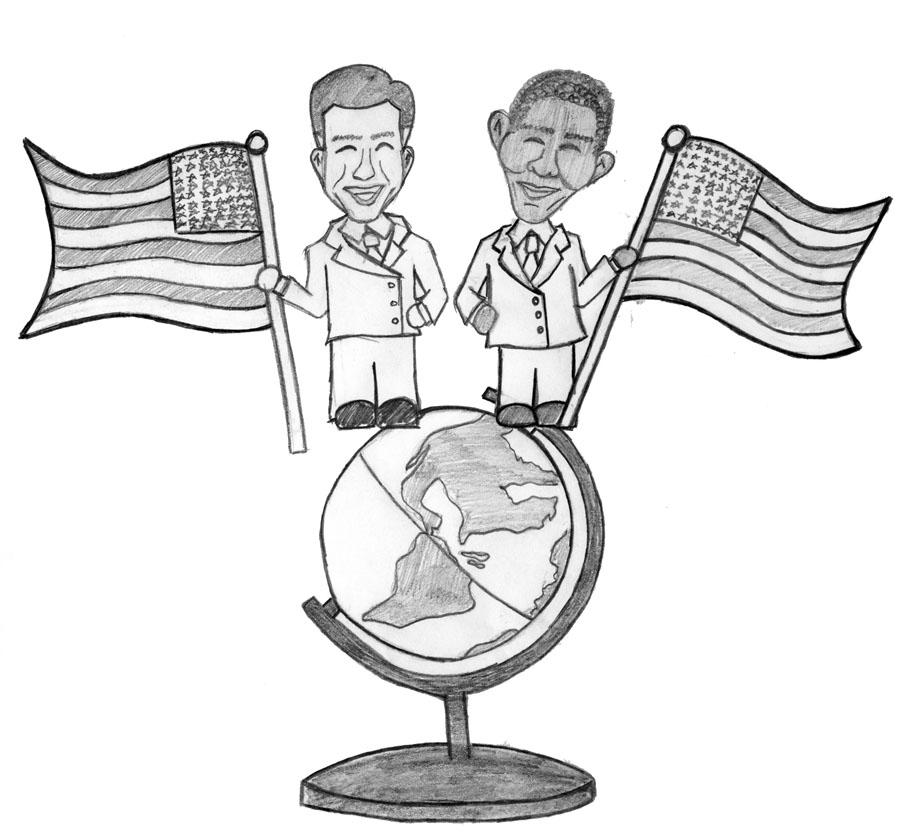Many may think that this election was about our domestic issues. A popular argument among voters has been that we need to fix the problems we have here at home before we fix the rest of the world’s problems. This simplistic ideal ignores the fact that our economic problems do not have an absolute solution and that the world’s affairs are intertwined, and that global problems concern all of us just as much as our domestic difficulties because our foreign policy has important impacts on the economy and national security.
Even if the candidates didn’t want to discuss the topic at length (Mr. Romney hardly talked about his foreign policy platform at all during his nomination acceptance speech, and both candidates linked everything back to domestic policy during the foreign policy debate), there are extremely important hot-button issues that should definitely should have been given attention. Many of them were given substantially less thought than the issues the two candidates hardly disagree on.
President Obama prided himself on having played a role in the destruction of al-Qaeda, touted his effective partnership with Israel, and took a hard stand against Iran. Republican nominee Mitt Romney opposed or criticized President Obama on each one of these issues.
For example, he attempted to discount the President’s claims to success against terrorism by running advertisements featuring Navy SEALS reminding him, “Mr. President, you did not kill Osama bin Laden, America did. The work that the American military has done killed Osama bin Laden. You did not.” Because of the immense amount of media exposure the al-Qaeda story had been given, as evidenced by the attack ads, it was considered a divisive foreign policy issue. This claim is unfounded, however, as the Presidential candidates didn’t hold distinct views on the subject, besides identifying who gets the credit for the death of Bin Laden.
There were also striking similarities between the candidates’ policies on Israel and Iran (both support Israel and promise not to allow Iran to develop a nuclear weapon), making these decisions irrelevant when it comes to selecting a President.
One issue that was not given enough attention was how the United States should interact diplomatically with Russia in the future. Early in his term, President Obama initiated the relations reset with Russia.
The Office of the Press Secretary reported to the American people in 2010, “President Obama and his administration have sought to engage the Russian government to pursue foreign policy goals of common interest…for the American and Russian people.” American support for rebellions that toppled Russian allies in the Middle East may have been a bump in the road, but those concerns have been addressed.
Julian Pecquet of The Hill noted, “U.S. efforts to ‘reset’ its relationship with Russia have led to very positive results despite the latest tensions over Moscow’s support for Bashar Assad’s government in Syria.” He specifically pointed to Russo-American cooperation when it comes to the war in Afghanistan, sanctions on Iran, space travel, and disarmament to prove his point. This was an issue where the candidates disagreed Romney stated that he considers Russia to be our “number one geopolitical foe.” This rhetoric makes for a dangerous political climate in the future. James Traub of Foreign Policy magazine wrote, “A President Romney, in short, might well turn Russia into the geopolitical foe which candidate Romney claims it already is.”
A second, more talked about issue had been the future of military funding. Republicans have been staunch advocates of maintaining defense spending at levels higher than the next nineteen armies combined. President Obama found this number troubling and set out to cut a trillion dollars in military spending over the next decade.
Conservatives have shot back at this proposal by arguing that it would harm national security, and their nominee wanted to raise defense spending from $6.5 trillion over the next decade to $8.3 trillion. This dichotomy forces Americans to answer a basic question: will defense spending reductions hamper security? In a recent New York Times article, former assistant Secretary of Defense, Lawrence Korb, argued in favor of the President by pointing out that under the Reagan administration, we had an unchallengeable military, but our budget did not have to undergo nearly the same buildup that it has over the past ten years. In addition, he argued that the United States faces few real security threats and that the cuts would force the Pentagon to stop wasting money.
These spending cuts could help the economy in the long run by reducing the deficit and therefore reducing the amount of interest the United States has to pay to countries that own its debt, or they could hurt the economy by pulling the rug out from under people who rely on government military spending for a living.
The Republican party crticized the President’s plan on the grounds that people depend on spending, but this seems to be inconsistent with the conservative party platform, which seeks to cut spending across the economy. In addition to the lack of uniformity, the Republican plan is dangerous.
Other countries may see increased American military spending as a preperation for aggression and ally themselves with China or Russia for protection.
The Romney-Ryan ticket criticized the President for apologizing to the world, but the alternative, a world indimidated by an unapologetic America, may be substantially worse.




